
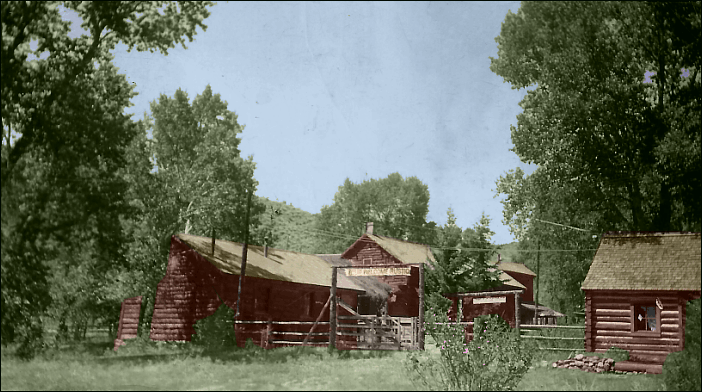
The Rustic around 1933.
|
For over a century, the Rustic Resort graced the Poudre Canyon near Fort Collins, Colorado. During that time, thousands of visitors checked into the Rustic; fishermen, hunters, newly weds, miners, vacationers and travelers, most of whom carry with them fond memories of the experience. Built in 1888, ownership of the Rustic passed through many hands and between 1931 and 1945 it was the property of William and Alice Richardson. For about a year and a half around 1933, their nephew Jim Bates came to stay with them and later recorded his remembrances of that time. The first visitors to the area around the Rustic were the Indians who camped just west of the site of the Hotel. As a boy, I found many arrowheads and other bits of history left by them when I was spading flower beds there. Many of the pieces I found have either been lost or given away.  My Uncle and Aunt were William J. and Alice Richardson. They had one daughter, Roberta. Uncle Will (shown at left) was a railroad man all of his working life, and became manager of the Kansas City, MO Railroad Terminal until it was necessary to move to Colorado for his health. After looking over many properties, they decided to purchase the Rustic on May 26, 1931. If I remember correctly, there were 60 acres on the north side of the river and 165 acres on the south side. The property was in great disrepair and needless to say, the folks had their work cut out for them. On the Rustic property was a huge hay barn that was used to supply the horses of visitors and travelers of yesteryear. It became an eye-sore, so my Aunt Alice suggested I tear it down and burn the lumber. The floor was made of 2 x 6 boards and had spaces between them to let hay dust fall through. While clearing away this old dust, I came to the area where the old office was located. One shovel full produced a number of old coins. Rushing to the fire, I scattered the old burning lumber and found a few more. As I cleared the rest of the hay dust I found about a cigar box full of old change. A few coins are all that is left of the collection I once had. The dates ranged generally from the 1860s to the early 1900s. 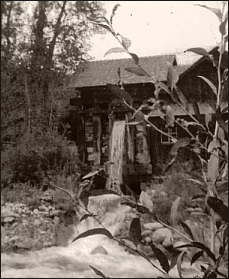 The Rustic was affected by the mining era as was the rest of the State. The power plant that once graced the property was originally built to furnish power for mining. There were also two mine shafts on the property. These were located on the south side of the river. One was on the east end and the other on the west about opposite where the old power plant ditch head gate stood.
The Rustic was affected by the mining era as was the rest of the State. The power plant that once graced the property was originally built to furnish power for mining. There were also two mine shafts on the property. These were located on the south side of the river. One was on the east end and the other on the west about opposite where the old power plant ditch head gate stood.Another memory of the early years of the Rustic was the main, if not the only, route the horse drawn wagons could get to the Poudre River in that area. They traveled down Pingree Hill, dragging logs behind them, so as not to injure the horses. There was a huge pile of old logs still stacked along side the road in back of the Rustic property when I was a boy. Many long winters of yesteryear were spent reading. A host of old books and magazines were stored in the pump house; many were very old - in the 1930s. The first project was to get everything livable. Then came the task of developing the Rustic into a resort that visitors could enjoy coming to, and have a good stretch of private fishing on the Poudre River. We covered the old board and batten with lodgepole pine slabs, a new roof and refurbished the existing cabins. One major project was getting the power plant back into operation, there was no REA (Rural Electrification Administration) then. The hydroplant was powered by a 150 HP turbine and a 24 foot by 12 inch belt to a Fairbanks-Morse 250 volt generator. The water power was obtained from the river via a ditch some 1300 feet in length. This plant was built in 1912, so it was necessary to replace much of the flume planking. Each seam had to be chalked with oakum and sealed with hot tar. Also,a cement and steel gate had to be added to divert high water conditions. One of the many pleasant boyhood memories of the Rustic was having to monitor the power plant during these storm conditions. It was a good time to study or read. In the background was the rushing water of the river and water going through the turbine. It's motion turned the big fly wheel fitted with the huge belt that clicked off it's revolutions to the generator emitting it's gentle whurrr. All this was mixed with a very special damp odor, a blend of water, wood and electricity. This solitude was often accented by guests coming down to inquire of this unique operation. 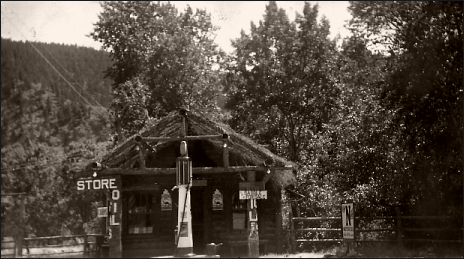 The Rustic Store. The Rustic store was added to the growing business. Also the addition of other new cabins became necessary - this included the cabins on the east side of 7 Mile Creek. The little log cabin to the east of these cabins was partially constructed by Linden Street on his property about three miles down the road. He abandoned the project and sold it to Uncle Will. We numbered each log in the house, then disassembled it piece by piece and rebuilt it on the Rustic property where it still stands.  This cabin was disassembled, moved three miles, then reassembled. Our water system was supplied by wells. Some cabin guests had to carry water, but the hotel water was provided by a pump house near the Pingree Hill entrance. It pumped water to the tank on the hill which supplied some cabins, the lodge kitchen and restrooms upstairs. The ice house was an important part of the operation. It was located near the river's edge east of the power plant. The building was about 20 feet square and had double 12 inch walls filled with sawdust. We cut our ice supply from the river just below the bridge. Ice was usually 15 to 20 inches thick and was cut with big, two-man hand saws, with one handle removed. This was done by cutting long parallel strips of ice, and then cutting them into blocks. These were hauled up the bank in a horse drawn slide system. Ice chips and snow were packed between the blocks and layers of ice. Sawdust was packed on all sides and about 20 inches on top when the total number of ice blocks were in place. One winter while making the initial cut for the ice harvest, I broke off the first piece which went under and I almost went with it. It was a long cold walk up to the cabin for dry clothes and to get warm. There was a small cabin just west of the store called Love Nest. The two cabins just east of Seven Mile Creek were built by Uncle Will and myself during my summer vacation of 1932, I believe. Just to the rear of the hotel was a long building that was a guest cabin in the front half and a big tool and equipment shop to the rear. Behind this building was the wood cutting department. We burned Lodgepole pine hauled in from the Chambers lake area. It was a constant chore keeping wood cut. There was also a cabin just to the west rear of the hotel. In this area there was a large underground cellar where many provisions were kept, including a huge crock of sauerkraut which was always "sampled" when in the cellar. During the winter months all food stuffs that would freeze were moved to the cellar where it never seemed to get below 38 degrees. It was always necessary to make a weekly trip to Fort Collins for supplies. Roberta and Aunt Alice always made the trip. Uncle Will didn't go unless he had business to attend to. At one period of time I did not go for nine months. Prohibition was abolished at the beginning of this period and when I did go, it was like another world to see all of the bars, signs and lights. Some of our supplies were brought by the mailman. He was a jolly fellow and always had something different to either bring along or tell about. One time he even brought a pet bear cub for company. He was the official mailman for Eggers, Colorado. This Post Office was about five miles down the road and consisted of a small family owned store, gas pump and a few cabins. Everything from there west was Eggers, Colorado Post Office. Our food supply was always helped in the summer time by a huge garden just west of the store. We planted carrots, beans, radishes, lettuce and almost anything that would grow there. Irrigation was from a ditch that came from Seven Mile Creek down through the property and under the road to the garden. I always preferred to spade this area by hand because I could Indian arrowheads, etc. My best find was a stone knife spearhead. We also had a good flock of chickens which kept us in eggs. Fryers were brought up from town for the guests and ourselves. Another boyhood incident occurred at this time involving the chickens. It was spring time and two hens had very good success with bringing about new families but there was a big barn owl that decided he was going to have a chicken dinner. He dined two or three times on chicks driving the hens to distraction. I proceeded to get Uncle Will's shotgun, loaded both barrels and hid beneath an old work bench to wait for Mr. Hooter. The hens sounded the alert and with that Mr. Hooter came. I pulled the trigger and accidentally set of both barrels at once. Needless to say, when I came to my senses, all that remained of the chicken thief were a few feathers. One night in March of 1933, I believe it was, aunt Alice awakened me and said, "Jim, look out the window. It's snowing". At this time there was almost two feet of snow and it was falling fast. By morning it had reached five feet. Everything had to be done at once and fast. First the roof had to be shoveled off. Then the cows were complaining wanting to be milked. I had to dig a path to the barn almost a block away. About half way down I realized I was off course and had to dogleg to get back in line. When I reached the barn I had to return for the buckets and wash clothes. Securing these at the house, I started back down my snow canyon but at the "dogleg", Betty the Guernsey cow was stuck in the bend. Back to the shovel - I dug her out and herded her back to the barn. Horses - that is another story. A family came through in a covered wagon and team of horses - almost broke and migrating to Wyoming. They stopped at the Rustic and we gave them food and fed their horses. They had two colts running along side and obviously they were not going to be able to make the trip much further. Uncle Will offered to buy them and they gladly accepted the offer. The next morning they departed while I fed the colts. They had huge ticks under their legs, so I got them to lay down to clean them off and put medication on the open sores. This quickly became a game and whenever I went near them they came running, laid down and expected to be "doctored". The larger colt gained weight and recovered her ordeal, but the little grey fellow could not make it and we lost him after two months of care. We also had a part Shetland pony named Jiggs. He was a gem. Stray stock had broken through the west fence over the river side and it was necessary to get this matter taken care of quickly and Jiggs was my fence fixin' helper. With a roll of wire, pockets full of staples, a puller and hammer, we 'hit the trail' to fix the problem. No saddle or bridle, just talk and knee control was all that he needed. We were about to reach our area and came to a ravine were a jackass stood. Now Jiggs had never seen one of those critters before and when the long eared thing let out his greeting - well, it sent Jiggs flying off to safety and I landed on the ground looking up at this alien. About ten minutes later,Jiggs got up enough courage to come back and get a better look at this strange animal. Since there were no schools in the Rustic area and it was necessary to try to keep up with my school work, Roberta suggested I go to the school at the top of Pingree Hill and see what they might have to offer. It was November and was turning cold. The road up to the hill was so bad I decided to ride Tiawana, our old mare horse. As I approached the top of the hill, the weather suddenly became snowy, cold and windy. The school was a happy sight to see but the teacher informed me that her classes were only up to the Junior High grades. So I returned down the hill and the long journey home. The snow was so bad by now that it was impossible to see more than a few feet. "Let's go home Tiawana", and I let her reins hang loose. When we arrived at the Rustic she walked right up on the porch. What more could you expect from an old friend? I was so cold the folks had to come out and help me down from the saddle. 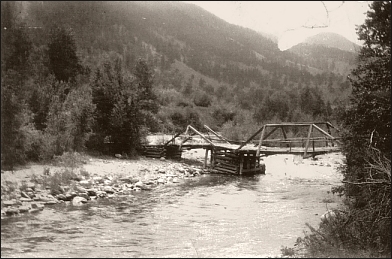 But there is a time when old friends must part. It had been a bad winter and spring had come. The pasture land across the river was a haven for the cows, horses and goats. The folks had built a new bridge giving access to this primitive area. Fishing was great on that side and wildlife was abundant. One evening as I went over to get the livestock, Jiggs stood at the gate near the bridge, tossing his head. Tiawana was missing. "Let's go find her", and together we went down the trail. In a green grassy spot near the willows, she had laid down for her last time. The next morning we went over and dug her final resting place. Uncle Will and I rolled her over and into the grave. It was indeed a sad occasion. The next morning we had our annual spring project of getting the power plant into operation. Replacing planking, chalking the seams and tarring over them. It had been a long morning and at the stroke of 12;00 Aunt Alice gave us her melodious call, "yoooohoo" for lunch. As we approached the cabin we heard sounds of fighting animals going on over the river. We had five dogs, a little Brindle bull, a bird dog, a Whippett, and two part Collies that were (we were told) part Coyote. One was called Chinkopin, an Indian name for "little acorn". This sound disturbed her more than any of the other dogs. After lunch I took all the dogs and went across to see what the problem might be. The sound came from the area where we buried Tiawana. As we approached her grave, I could see a large hole had been dug into it and something had been eating her. The dogs all headed into the willows adjacent to her grave. I gathered the largest rocks i could carry and chucked them into the grave. I had just picked up an over sized rock and was "duck walking" it over to the hole when all five dogs came racing out of the willows followed by six large grey wolves. When they saw me they stopped. Their hair was standing up on their shoulders and their slanty eyes were sizing up my situation. My thoughts were to run but a second thought was to stare them down. The dogs were behind me whimpering. The wolves' decision fortunately was to turn and disappear back into the willows. This indeed was a primitive area and was also abundant with porcupines. One evening while crossing the bridge saw I a bobcat walking around and around a porcupine near the river. With patience, the bobcat was finally nose to nose with the porcupine. Then, with lightning quickness, he slipped his paw under the porcupine's stomach and ripped him open. He had earned his meal that evening. To help rid us of this infestation of porcupines, I took the guests porcupine hunting on Saturday evenings. Some guests were dubious of this hunting party and asked if it was the same as 'snipe' hunting. No, was the answer and an old baseball bat was all that was needed. Since the porcupines came down from the trees a little after dusk for forage and water, it was the best time to hunt them. To shoot them was to no avail and it was better run up along side them and whack them between the eyes. There had been an old law passed that they could be killed only in case of emergency for survival. So for the guests with a taste for 'survival of the past' we would barbecue them on an open pit, along with more modern culinary delights. Roberta married and her husband Jack, was the area game warden. While driving down Pingree Hill one evening he ran into a porcupine. When he removed it from the road he noticed it was a female about to give birth. He opened her and found there were two babies still alive. He brought them home, bottle fed them and soon they became house pets. During the day they would curl up on the cellar roof vent and sleep. Penny, my favorite, would ride on my shoulder, but if something disturbed her she would start to bristle up. "Penny, stop that!", and she would nestle down again. Deer hunting was good at the Rustic. Hunters that stayed with us had their favorite place to hunt. One hunter came up every year, never got up early, as the others did, but always had a prize buck by noon. Many of the deer herds would gather on the big hill back of the Rustic, 50, 75 or 100 would be there during the winter months. The year we had five feet of snow was a disaster for the deer. They were giving birth and the storm caught them with little to eat. After the snow melted enough for the road to be opened, they brought in alfalfa and cottonseed meal and spread it along the road. This didn't prove to be too successful since the ones that made it to the road gorged themselves. Later, going back into the hills where the does had their fawns, both were curled up and dead. This had a disastrous affect on the deer population that lasted for years to come. The spring thaw that year made the Poudre River rise to a record high. The water washed away much of our river bank as it made a right angle turn before heading toward the power plant and under the bridge. The next winter Uncle Will and I decided to build a log and rock retaining wall at this wash point. I built a large sled with guiding front runners. Rock had to be gathered up river, so I rode the sled down the river loaded with several hundred pounds of rocks and up a snow packed ramp to the top of the cribbing where the sled stopped. Needless to say, our project was a success. Many other projects were done as the seasons allowed. The building of a rail type fence along the road on each side of the hotel. Being a master craftsman, Uncle Will wanted the posts worked out with a wood chisel so the round rails would fit into the posts' sockets. I don't remember how many posts and rails I worked to get the project finished. Waiting on customers and guests was a constant project, to supply the cabins with ice as well as the hotel. Many nights someone would need gas after hours. One night I went down to wait on a man who was evidently a logger in the Chambers area. "Fill 'er up", he demanded. I thought this a bit strange as he was headed toward Fort Collins where gas was cheaper. But I did as he requested. Then came the remark, "I can't find my billfold. Well, I answered, "Ill give you 15 seconds to find it or else", and reached for an ice pick in the ice chest and pressed it against his tire. "You little...you wouldn't dare", came his answer. He reached in his car, brought out his billfold and the confrontation was settled. In another incident, a group of college students from Greeley came in late one evening wanting a cabin. All we had left was our winter cabin so I put them in there. They paid for one night but I did not have the register so I mentioned to them to register in the morning. I started back to the hotel but remembered to write down their license number. The next morning, they were gone, along with many of our valued furnishings. I went back to the hotel, got on the phone and told the Livermore operator to get the Sheriff in Greeley. He often was a guest at the Rustic. "Don't worry", he said. "I'll have them back there very soon, I need a fishing trip anyway". Soon, here they came with all they had taken, replaced it, then had to sit there while the Sheriff fished. He then escorted them back to Greeley. Mr. Steve Pendergast owned a mine about two or three miles up on Seven Mile Creek. He mined his Manhatten Mine in the summer and the Seven Mile mine in the winter. I would take his mail up to him and any food he needed during the winter. It was a nice hike up to his place and I always brought him a cottentail rabbit or two. He was always so grateful, he would never catch a rabbit for himself but accepted what I brought him. I remember one trip up to see him was bitter cold. He said' "Jim, it sure got cold last night, I took my tatters to bed with me and they stole froze". On occasion he would give me a small piece of ore called a 'kidney stone', very rich in gold and silver. Once a year he brought his ore to Colorado Springs to the Golden Cycle Mill for processing. 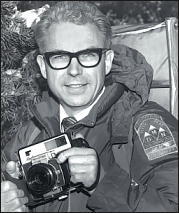 Christmas was fast coming upon us again and the folks realized it was necessary for me to return to school in Colorado Springs. It had been a year and a half since I had been in school but it all came back very easily and I made A's and B's all through high school. While in school I began to work at the Alexander Film Company as assistant cinematographer where I worked until World War II and then became a combat photographer.
Christmas was fast coming upon us again and the folks realized it was necessary for me to return to school in Colorado Springs. It had been a year and a half since I had been in school but it all came back very easily and I made A's and B's all through high school. While in school I began to work at the Alexander Film Company as assistant cinematographer where I worked until World War II and then became a combat photographer.Editor's Note: Jim's combat experiences began on D-Day when he parachuted into German held France then recorded the progress of the 3rd Armored Division on it's push to Germany. Noteworthy was his filming of the assault on Cologne and the aftermath of the Nordhausen concentration camp. Jim Bates Jim Bates' sister Alice, likewise has fond memories of The Rustic - The summers of 1934 and 1935 we vacationed at the Rustic located up the Poudre Canyon. The Rustic was owned by Dad's aunt and uncle, the Richardsons. William J. Richardson was born in 1868 in Meigs County, Ohio, son of Robert Richardson, an immigrant from Scotland. He (William) worked for the railroad most of his life. He started as a conductor and by the time he retired, he had risen to a management position at the Kansas City Station. Alice Christina (Spencer) Richardson was born 13 Sept 1870 in Westport, Decatur County, IN. Her parents were Franklin Spencer and Permelia Hancock. She married William J Richardson on 28 Sep 1889. Shortly after her marriage, her sister Ida Viola died at age 23, leaving her 18 month old baby (Otis) mother less and she took over the care of my father, Otis H Bates. Otis remained in the care of his aunt until he was about 13 at which time she sent him to his Dad, Henry Luther Bates. Otis had bonded to his Aunt Alice and was not happy living with his dad who had remarried and had 3 children with his 2nd wife. When he was 18, Otis boarded a freight train headed for Denver where he left the train and walked about 60 miles to Ft. Collins where the Richardsons lived. 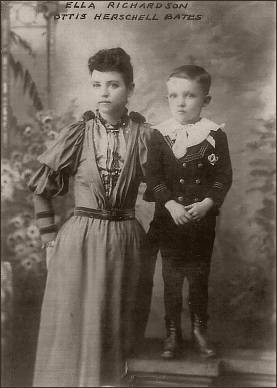
Aunt Alice was very impatient with small children. When we vacationed at the Rustic, she made it very clear that we were not to play around the hotel and store. When I was a small child she intimidated me. But by the time I was 12-13, I figured out how to earn her praise, which was hard work. Because all my grand parents were dead, she was the closest to being a grandparent that I would ever have. Eventually she became a role model for me. Uncle Will was as mild mannered as Aunt Alice was impatient. There were times when we would see Uncle Will outside the store, we would ask him if we could come in the store. One day he ignored his wife's rules and invited us into the store where he gave us some candy, Aunt Alice happened to come in the store and, saw us there and lost her temper. She scared us to the point that the younger ones started crying. I can still hear Uncle Will trying to calm her down by saying "now Alice, calm down, you're scaring the children." His wife Alice didn't believe in saving their money in banks but preferred to stash it away in a metal box. When the stock market crashed in 1929 their savings were secure and they were ultimately able purchase the Rustic Resort. The Rustic was a wonderful place for children to play with it's playground, horses, goats, chickens and ducks. The hotel lobby was furnished with rustic furniture and had a stuffed elk head with huge antlers over the fireplace. Bedrooms for the guests were on the second floor and by today's standards, they were quite small. At the end of the hall there was a turn of the century bathroom for the guests. The kitchen was the largest room in the hotel and contained two black cooking stoves, two sinks and a large pantry. The dining room was small with only four or five tables. 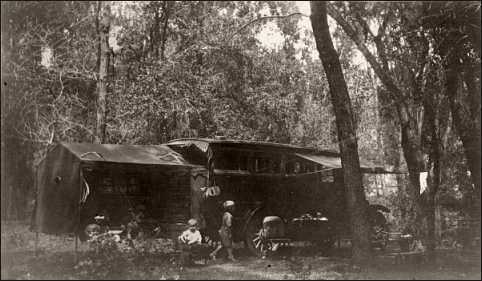
When we visited Uncle Will and Aunt Alice, we camped by the river close to the bridge. We kids loved to play on the bridge dangling our legs over the edge and looking into the water below so clear that you could see the rocks and an occasional fish. The river was a fly fisherman's dream. My dad loved to fly fish and looked forward to fishing when he wasn't helping Will with the power plant making sure it was in good working condition. I have very fond memories of the Rustic and am so disappointed that the buildings no longer exist as they were when the Richardsons owned it during the years 1931 - 1945. In 1941 we as a family visited the Rustic for the last time. My Dad, Otis Bates parked the trailer close to the river and pursued his passion of fly fishing. The Poudre River was his first choice to fish for rainbow trout. My Dad in full fishing gear with his creel slung over his shoulder would wade slow and methodically up and down the river, arching his fly line in hopes of catching a couple of large trout. Occasionally he would luck out and we would have trout for the evening meal. There wasn't much for a teenager like myself to do there. While Daddy was fishing and my mother was at the hotel helping my Aunt Alice with her work, I would take the smaller children on walks exploring new paths. I always would stay close to the river so as not to get lost. There were times when we would sit on the log bridge and dangle our feet over the edge as we gazed into the water that was so clear you could see the rocks and an unsuspecting fish would take the fly and we would have fish for dinner. There was the time we saw Daddy fishing and yelled at him which he surely didn't appreciate. Aunt Alice worked very hard to keep the hotel and cabins in excellent condition for the guests. Uncle Will was in charge of the store and station, they also had a "handy-man" to do odd jobs on the property. There was plenty of work for the Richardsons to do, so the children had to stay out of the way. I was more or less in charge to see that the little ones stayed by the trailer or the playgrounds. The day before we left to go home Aunt Alice invited the family to dinner. We girls were dressed in the new dresses that were bought before we left on our trip. Before dinner Mom sat us down and schooled us on the rigid table manners that Aunt Alice expected. The extra long table was covered with a white, freshly ironed table cloth and there were cloth napkins at each place setting. I helped Mom set the table and while we were in the large pantry gathering dishes, she handed me some small, oval-shaped dishes. I asked what they were used for, and she replied they were finger bowls that were filled with water to clean remnants of food that were left on the fingers. I think we had fried chicken that day. Auntie was an excellent cook and we all enjoyed the meal. We minded our manners and received a compliment from Auntie. The night before we left, Auntie invited my parents and myself to their living quarters in the hotel, located to the left of the main building. They had the most beautiful, massive, Victorian furniture. I was so impressed with the furniture that I hoped someday I would own some of my own. When I was near seventy, finally realized my dream of having Victorian style furniture. My Victorian furniture is not massive, but I love it just the same. That was the last trip that we as a family visited the Rustic. Daddy would go drive up there once or twice a year without the family when the power plant needed work. One time he took me with him and I had a good visit with Auntie. That was the last time I saw the Richardsons. Aunt Alice passed away 1 June 1945 at the Rustic and Uncle Will died 27 April 1947 in Gypsum where their daughter Roberta lived. Both of them were buried in Grandview Cemetery, Ft. Collins, CO. Alice DeWitt |

1. Rustic Resort as seen from the back. ca. 1933
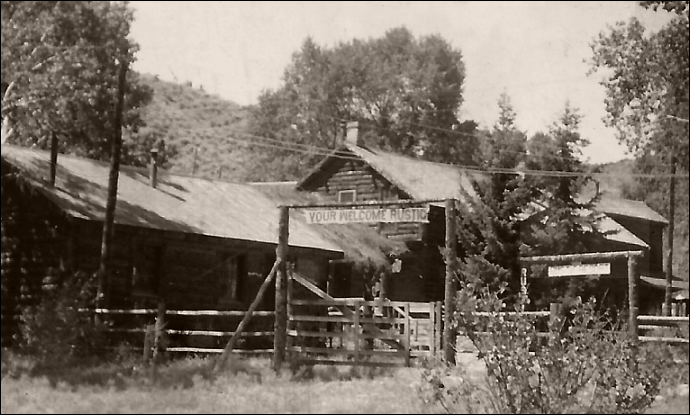
2. A closer view.
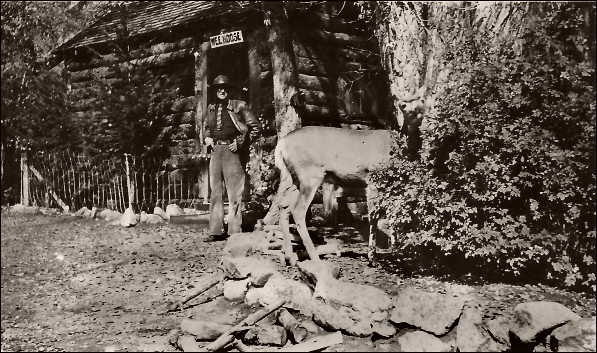
3. The sign above the door reads "Wee House". Each cabin had a name.
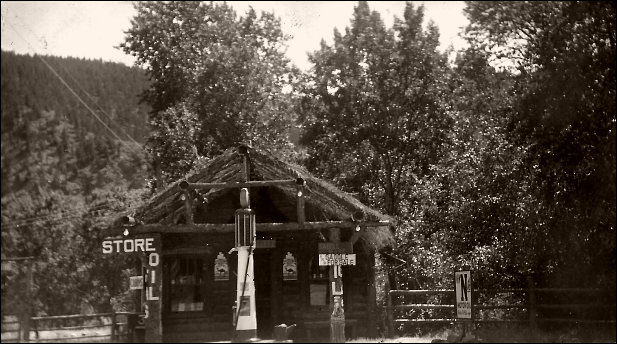
4.The Rustic's store.
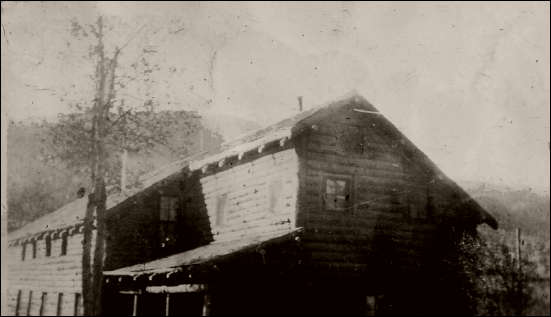
5. Rear of hotel.
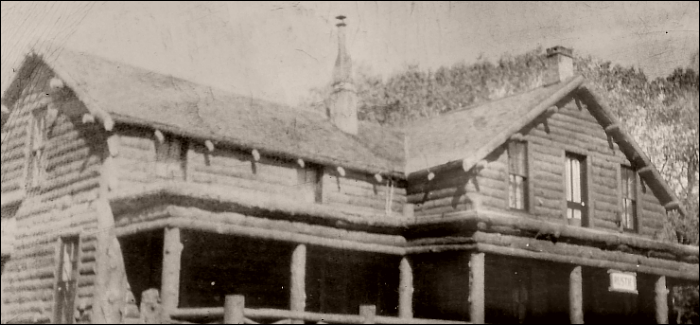
6. Front of hotel.
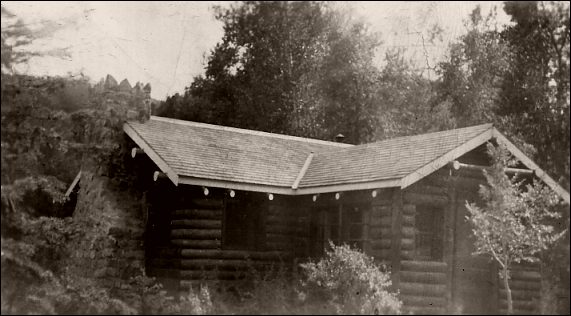
7. The cabin purchased from Linden Street then moved three miles.
Each piece of the cabin was numbered before disassembly. ( see below )
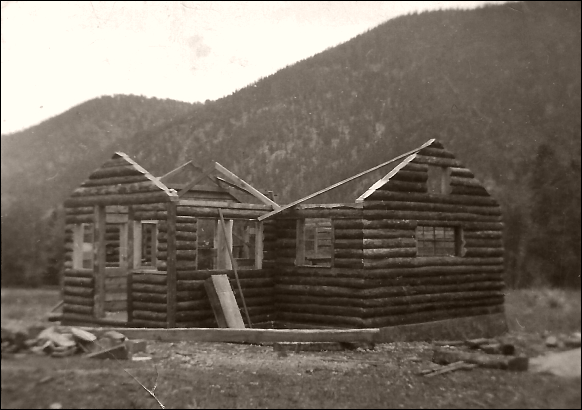
8. The same cabin being reassembled at new location.
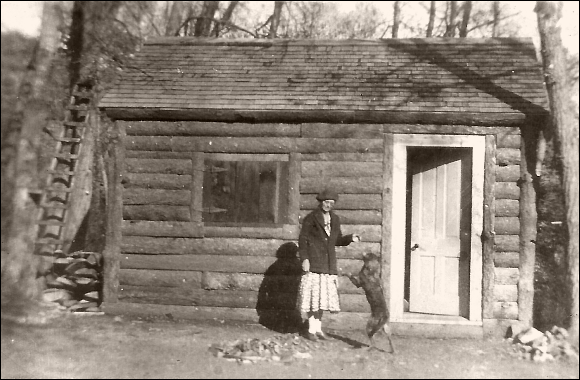
9. The pantry and cellar.
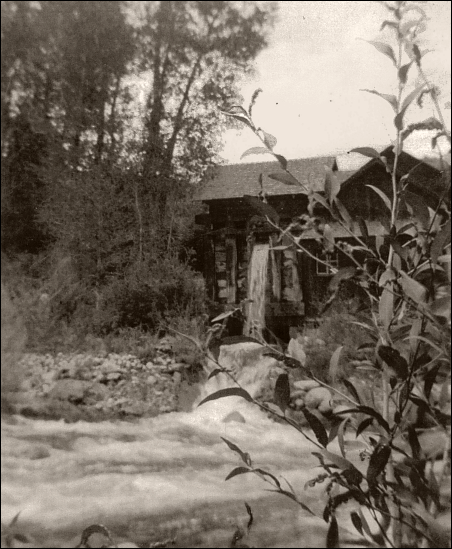
10. The Rustic's hydro-electric power plant.
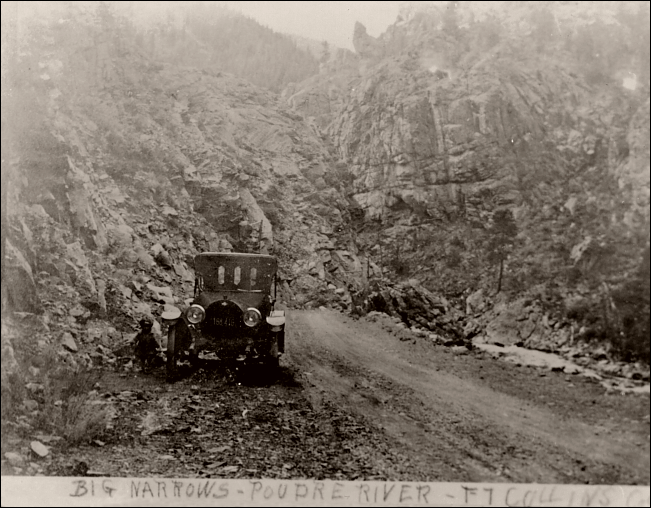
11. Big Narrows in Poudre Canyon before construction of a tunnel in 1920.
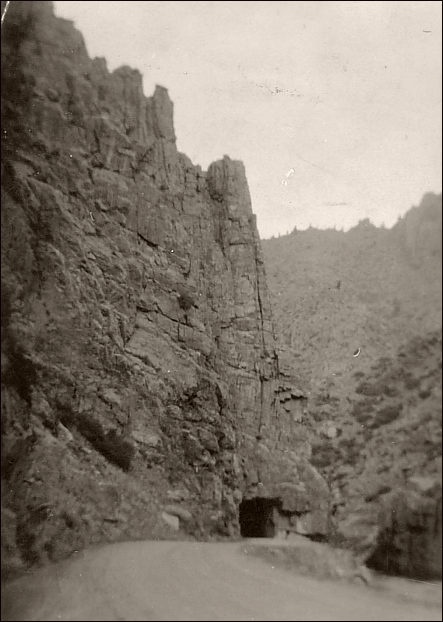
12. Big Narrows Tunnel in Poudre Canyon. ca. 1941
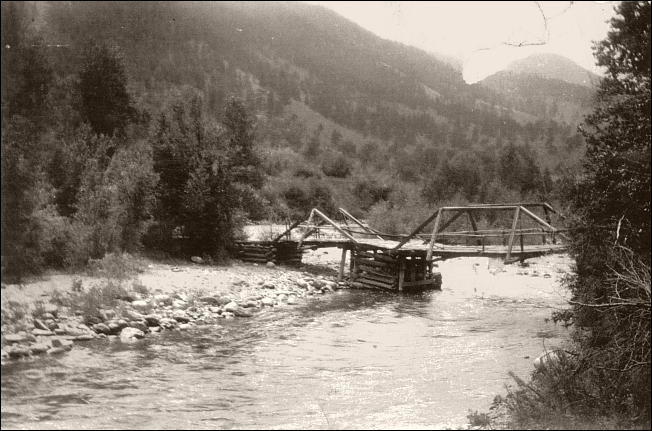
13. A bridge on the Poudre near the Rustic - the fishing here was excellent.
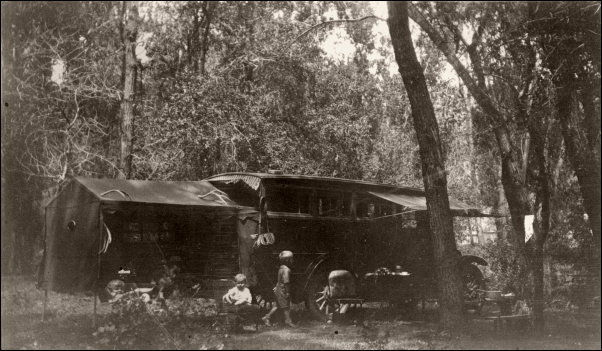
14. The Bates clan camping at the Rustic. ca. 1934 - 35
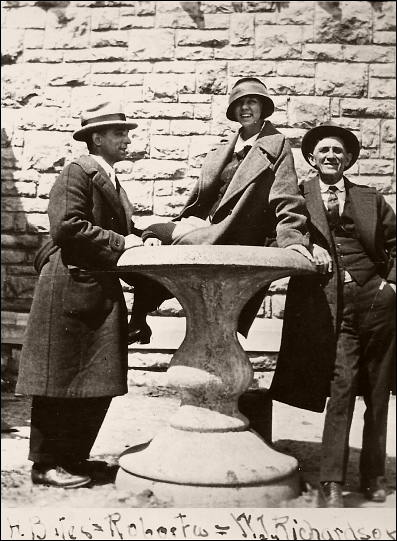
15. Otis Bates, Roberta and Will Richardson just before purchasing the Rustic.
Otis is Jim Bates' father.
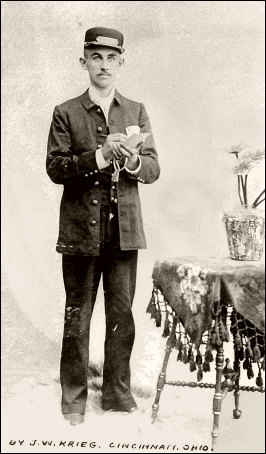
16. Will Richardson.
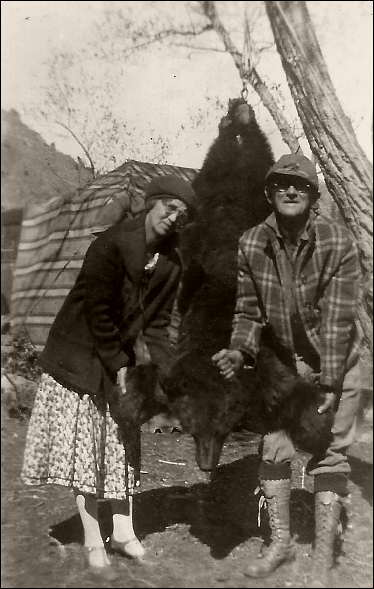
17. Alice and Will skinning a bear.
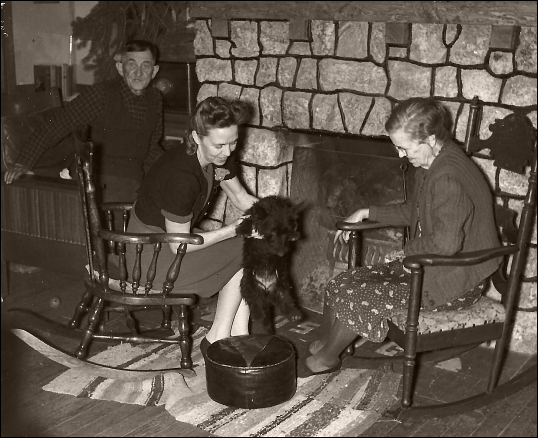
18. Left to right - Will, Roberta and Alice Richardson.
The bear cub remains nameless.
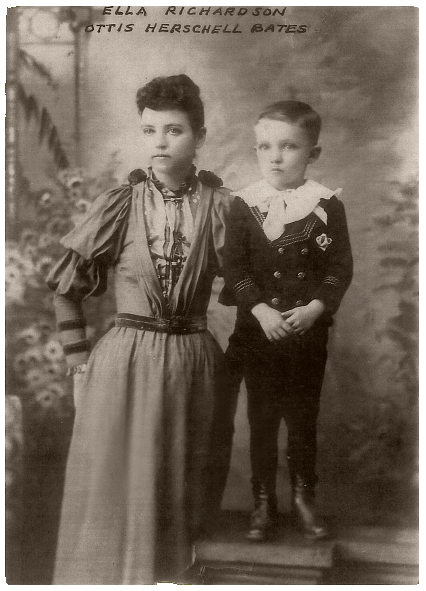
19. Ella Richardson and young Otis
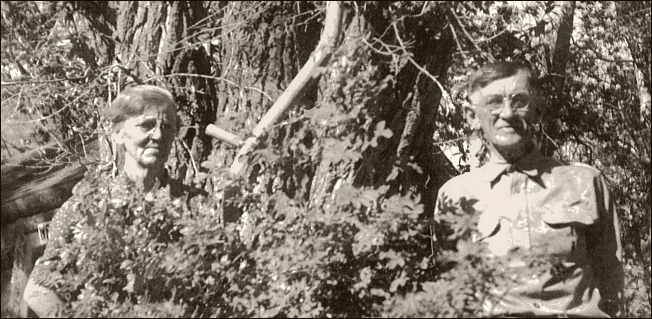
20. Alice and Will Richardson.
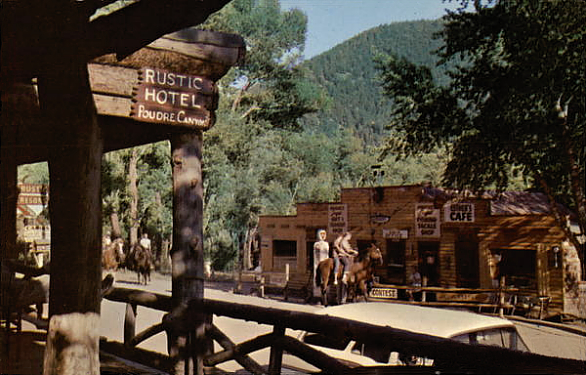
21. A postcard from several years after the Richardsons sold the Rustic.
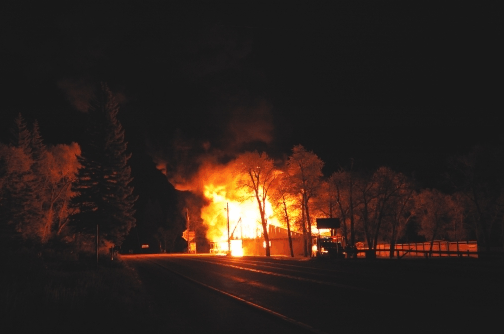
22. The Rustic, 120 years old, burns to the foundation, June 1, 2008.
© copyright 2012 by W.A. DeWitt and Alice DeWitt
All Rights Reserved